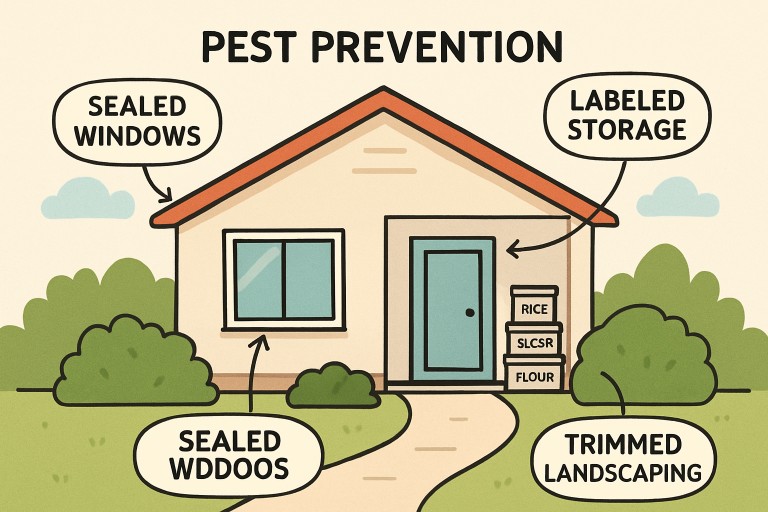Maintain Cleanliness and Declutter
Clean, clutter-free homes are the first defense against pest infestations. Sweeping, vacuuming, and dusting regularly ensure that crumbs and debris, which attract everything from ants to roaches, are promptly removed. Pay close attention to the often-overlooked areas under large appliances, behind furniture, and in storage rooms, as pests favor dark, undisturbed environments.
Decluttering plays an equally important role. Regularly removing stacks of newspapers, excess cardboard, and other unused items keeps your living spaces uninviting to pests seeking cozy hiding places. This simple practice makes your home less likely to become a target for infestations-and if you do encounter an issue, pest control in Columbia, SC offers prompt, professional solutions tailored to your needs.
Maintaining your yard by trimming bushes and removing standing water can also help prevent pests from entering your home. Ensuring that your home’s exterior is well-sealed and weatherproofed further reduces the likelihood of invasions.
Seal Entry Points
Homes naturally develop tiny cracks and gaps over time. These unnoticed entryways are invitations for insects and rodents. Conduct a thorough inspection of your home’s exterior, focusing on the foundation, windows, doors, and all places where utility lines enter. Apply weatherstripping, caulk, and door sweeps to seal any gaps. These simple fixes can block a wide range of pests, from ants and spiders to mice, enhancing your home’s security and peace of mind.
Store Food Properly and Manage Waste
Preventing pests means denying them food. Store pantry staples and pet food in airtight containers and promptly clean up any spills or crumbs. Dirty dishes left overnight can attract pests such as flies and cockroaches. Trash bins must have tightly fitted lids and be emptied regularly. Compost bins, if used, should be carefully maintained away from the house to prevent scavenging by animals and insects. Regularly inspect your home for any openings or cracks that pests could enter through, and seal them promptly. Keep outdoor areas tidy by trimming bushes and removing standing water where pests might breed. For comprehensive guidance on safe food practices and kitchen sanitation, the CDC’s food safety guide offers useful tips to help maintain pest-free kitchens.
Control Moisture Levels
Many pests, including termites and silverfish, thrive in damp conditions. Fix water leaks, dripping faucets, and condensation-related issues promptly. Use dehumidifiers in basements, crawlspaces, and any area that feels damp or musty. Make sure attics, bathrooms, and closets are well-ventilated to keep moisture levels in check. Reducing humidity not only deters pests but also helps prevent mold and improves overall air quality.
Maintain Outdoor Areas
An unkempt yard can easily become a haven for pests, which may then enter your home. Mow the lawn regularly and keep shrubbery and tree branches trimmed away from the house to reduce entry points for pests. Remove standing water in birdbaths, buckets, or gutters to eliminate mosquito breeding grounds. Store firewood and mulch away from your foundation, as these can shelter rodents and insects. Clean gutters reduce potential nesting spots and water accumulation that attract pests.
Maintaining a tidy perimeter is a simple way to prevent bugs and rodents from seeing your home as an easy target.
Use Natural Repellents
Natural solutions such as essential oils-peppermint, eucalyptus, and lavender-can deter many common household pests. Diatomaceous earth, a silica-based powder, can line baseboards and entryways to provide a chemical-free barrier against crawling insects. Always follow safety guidelines when using these products around children and pets. While natural methods may not eliminate infestations, they provide an extra layer of protection in your pest prevention strategy.
Regular Inspections and Professional Help
Inspect your home at least quarterly for telltale signs: droppings, gnawed packaging, shredded materials, and unfamiliar musty odors. Early detection allows for swift action, reducing the need for drastic measures. If your prevention efforts aren’t enough and pests still find a way in, call on trusted local professionals before the problem grows. Experienced exterminators can deliver targeted treatments, thorough inspections, and practical advice tailored to your location and home.
Educate Your Household
Everyone in your household should be on board with your pest prevention plan. Encourage kids to store snacks properly and tidy up after themselves, and remind all family members to report any warning signs immediately. When everyone participates, your pest prevention routines are easier to maintain and more effective overall.
Taking these simple, proactive steps will help you safeguard your home from unwanted pests. An ongoing commitment to cleanliness, maintenance, and regular inspections ensures your household enjoys the comfort-and peace of mind-of a healthy, pest-free home.

